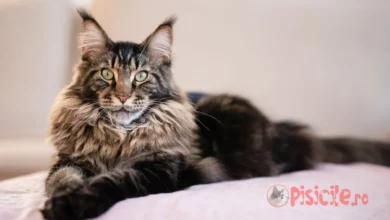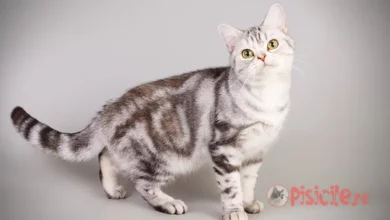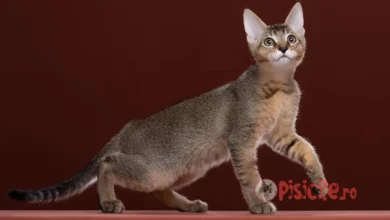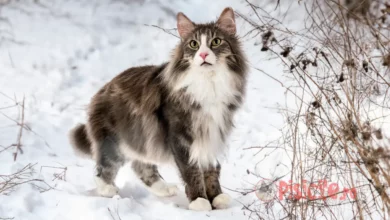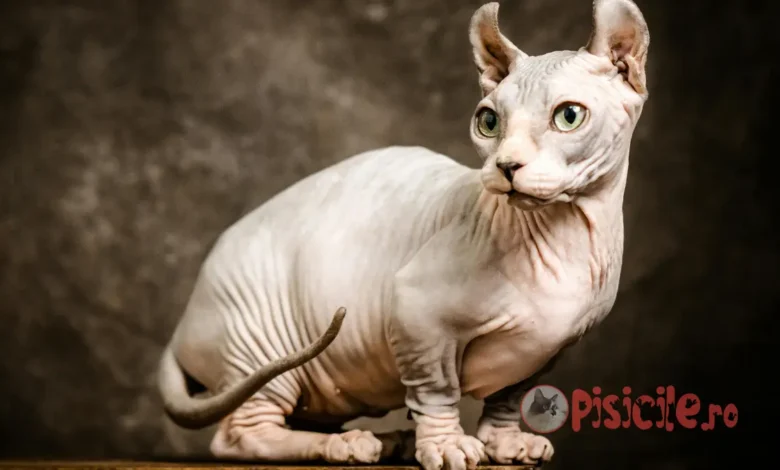
Sphynx cat. A fascinating and unique breed in the feline world!
Everything you need to know about the Sphynx cat, from breed characteristics to care and nutrition.
If you want a feline that is really special and unique in its appearance, then the Sphynx cat is definitely the most suitable. The Sphynx cat is a perfect example of the diversity of the feline world, notable for its lack of fur, exotic appearance and captivating personality.
Originating in Canada in the 1960s, this breed was developed through controlled mating, becoming beloved both for the close bonds it forms with its owners and its increasing media presence. By far, this breed is the most publicized due to its appearance that manages to arouse the curiosity even of people who do not necessarily want a cat in the house.
Subject
General characteristics of the Sphynx cat
The absence of fur and skin covered with fine down is the main characteristic that defines the Sphynx cat.
- Size: Medium to high.
- Weight: Between 3.5 and 7 kilograms.
- Fur: Absence of fur, skin covered with fine down.
- Skin color: Variety of colors and patterns (white, black, brown, gray).
- Ears: Large and broad at the base.
- Eyes: Large, lemon-shaped, varied colors.
- Temperament: Friendly, affectionate, sociable.
- Care needs: Regular baths, ear cleaning, sun protection.
- Health problems: Predisposition to hypertrophic cardiomyopathy.
- Adaptability: It adapts well to various living environments.
- Diet: Rich in protein and healthy fats.
- Popularity: Growth due to unique look and media presence.
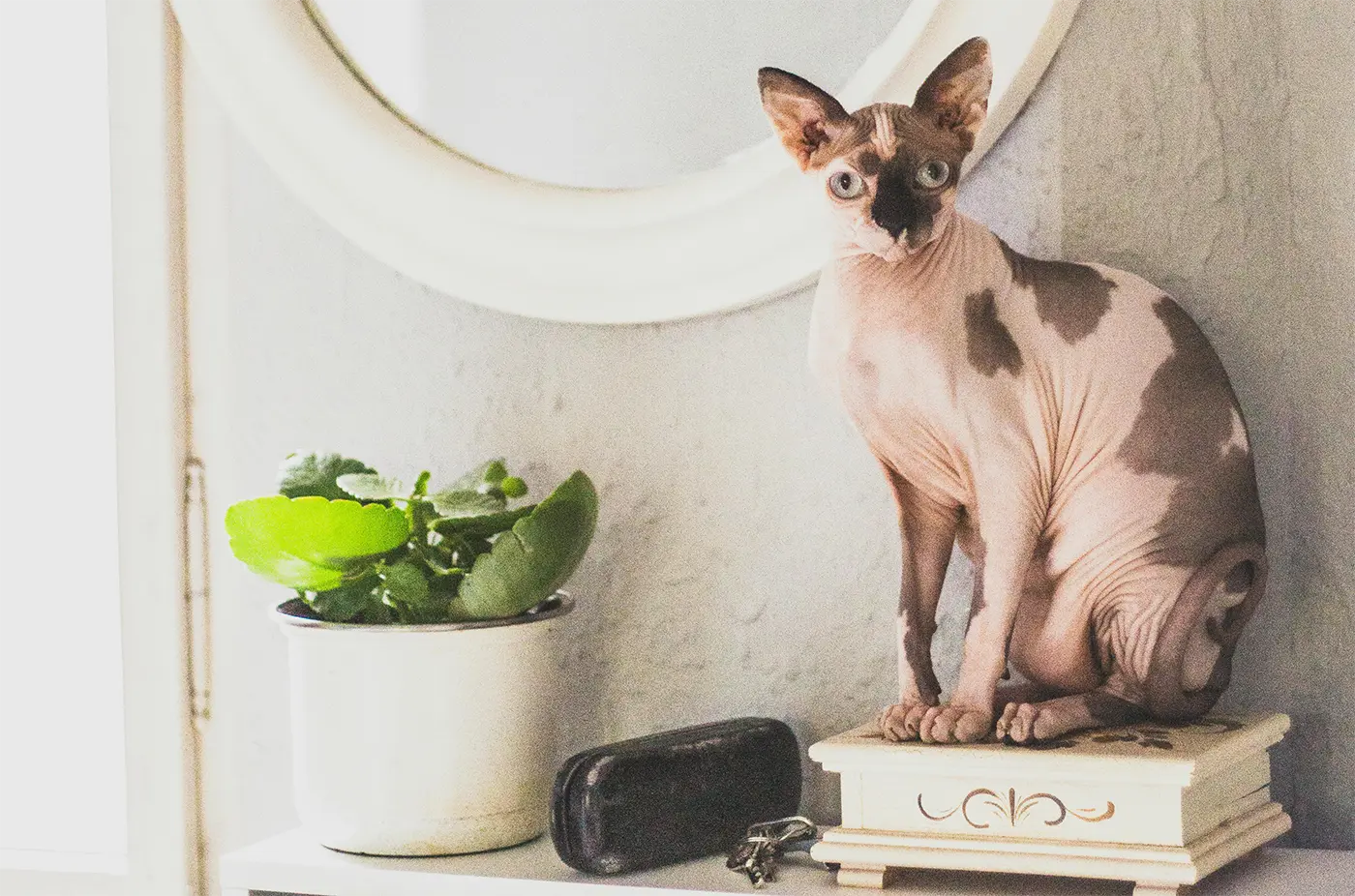
How the Sphynx cat appeared and how this breed developed
The origin of the Sphynx cat is a very fascinating one, having its roots in an accidental discovery. Someone didn't necessarily want to make a breed of cat without fur, it just happened to be that way. In 1966, in Toronto, Canada, a domestic cat gave birth to a hairless kitten named Prune, due to a spontaneous genetic mutation. This event marked the beginning of a new breed, attracting the attention of breeders and geneticists who saw in this unique trait the potential for developing a distinct line of cats. Prune became the genetic basis of the future Sphynx breed, being strategically bred and crossed to stabilize the hairless characteristic.
The story of the Sphynx breed does not stop there. After this discovery, carefully planned breeding programs were initiated. Breeders used controlled matings between Prune's offspring and common domestic cats to strengthen the genetic pool and minimize associated health risks. In the 1970s and 1980s, breeders from North America and Europe worked closely together to define the breed standards. Important figures such as Milt and Ethelyn Pearson of Oregon were instrumental in the development of the breed, working with geneticists to ensure its viability and health.
The official recognition of the Sphynx cat was a gradual process, reflecting the sustained efforts of breeders from several international professional associations. In the 1980s, important organizations such as The International Cat Association (TICA) and Cat Fanciers’ Association (CFA) they started to include Sphynxin their competitions. In 2002, CFA gave the breed championship status, marking an important moment in the recognition of this unique breed. Standards set by felinological organizations defined essential traits such as hairless skin, large ears and expressive eyes, reinforcing the breed's identity.
Over time, the Sphynx cat has evolved from a genetic curiosity to one of the most popular cat breeds. Advances in genetics have made it possible to reduce the risks of hereditary conditions, ensuring better health for specimens of the breed. Today, the Sphynx cat is recognized not only for its exotic looks, but also for its affectionate and sociable nature, making it a popular choice for cat lovers around the world.
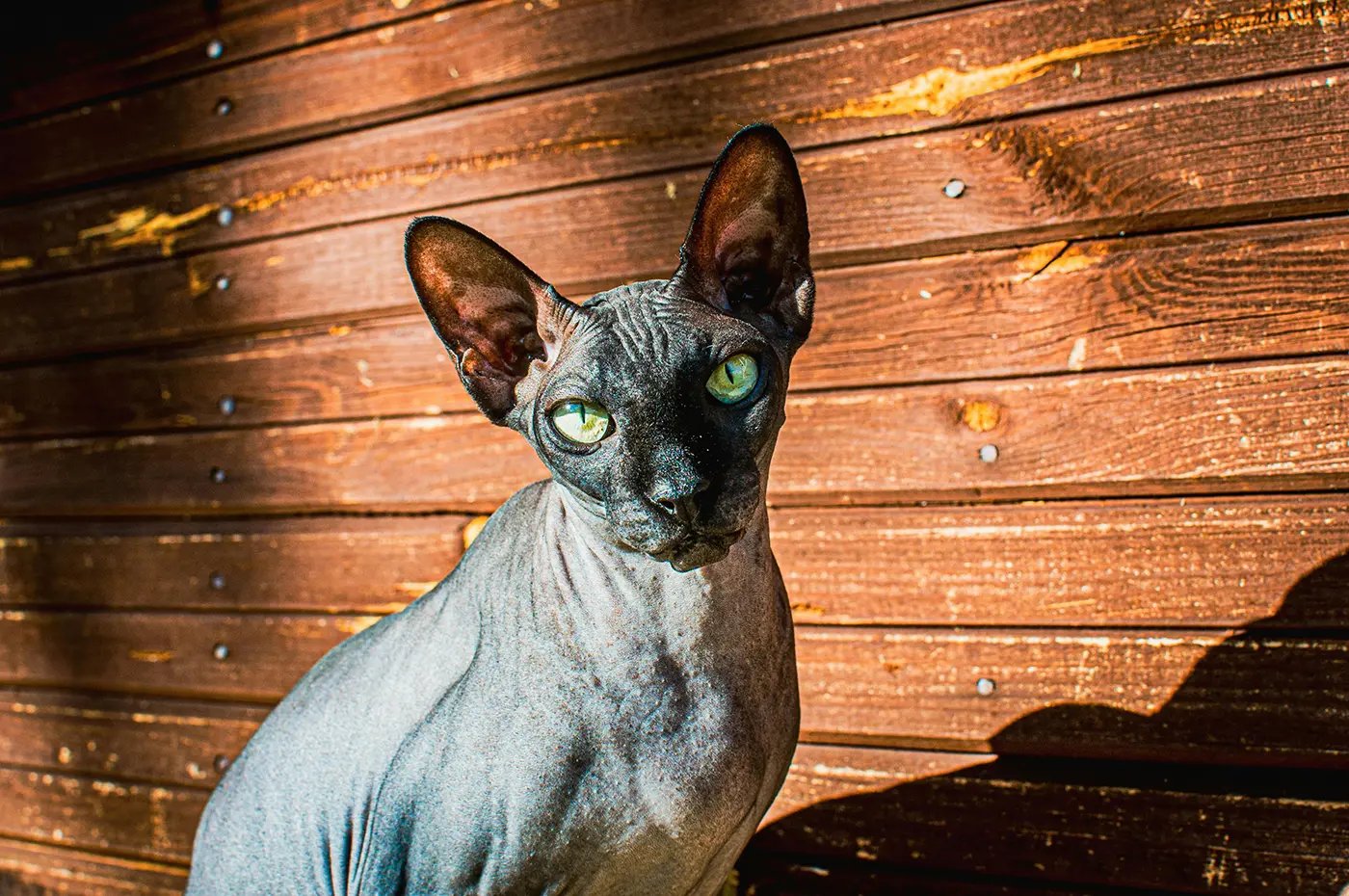
Distinctive Physical Traits that Define the Sphynx Cat
It is very obvious that one of the most remarkable physical features of the Sphynx cat is the almost complete lack of fur, which gives it a unique and exotic appearance. The body of Sphynx cats is covered with a very fine layer of down, similar to peach fluff, being warm and velvety to the touch. The lack of fur highlights well-developed musculature and skin that can vary in a wide range of colors and patterns, from light shades such as white and cream to dark tones of black and gray. The fur can also show various patterns, including brindle, spotted or colorpoint, giving it a diversity similar to that of cats with fur.
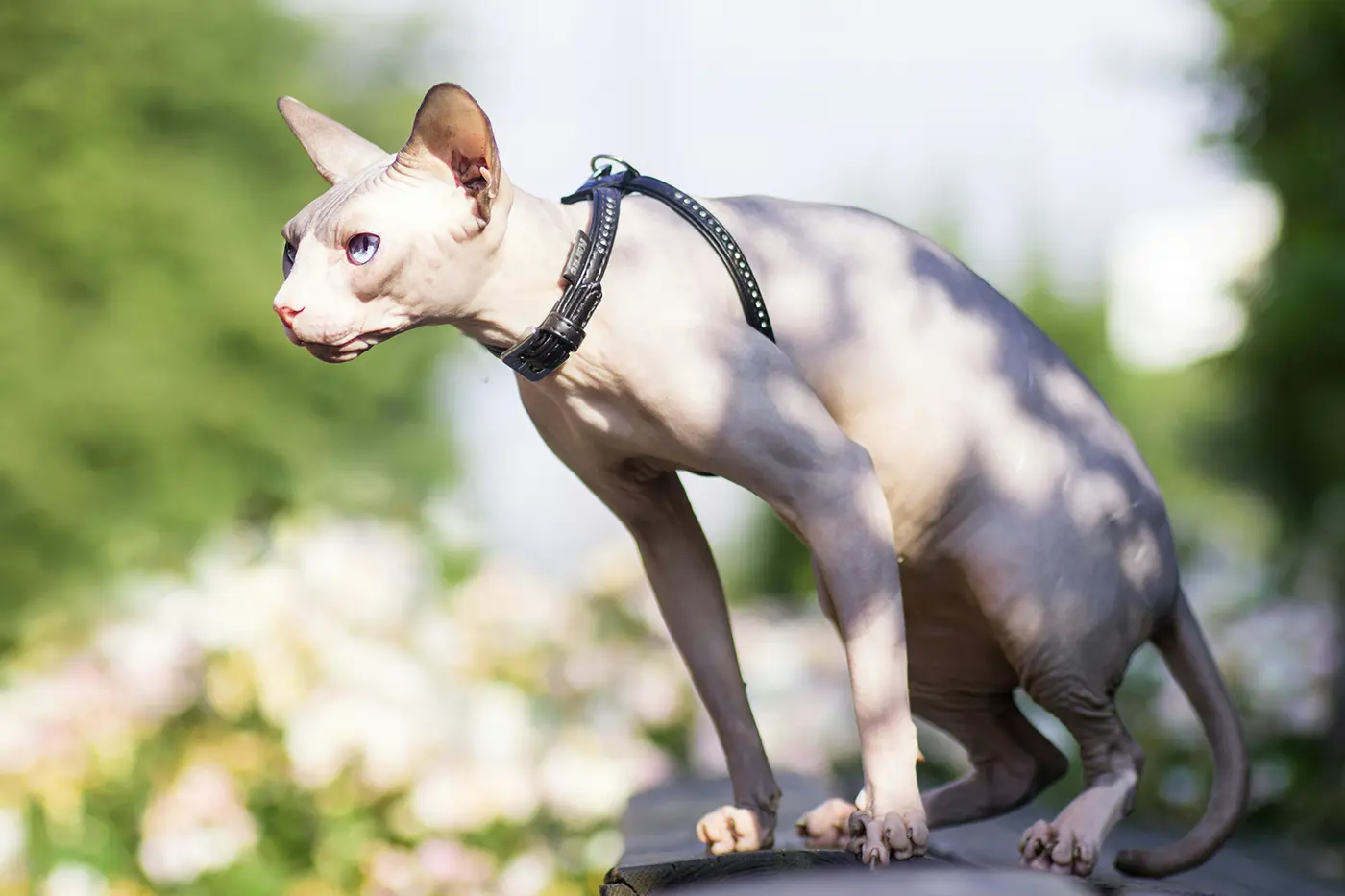
Although the Sphynx cat is primarily characterized by its lack of fur, another important and distinctive feature of the Sphynx is its head shape and facial features, which are unlike those of other cat breeds. The head is triangular in shape with very large ears and wide at the base, giving it an almost alien appearance. The eyes are large, almond-shaped, similar to lemons, and can be vibrant colors such as blue, green or gold. These facial features give it a mysterious and elegant air, contributing greatly to the breed's unique appearance. In addition, long, thin legs finished with delicate paws and thick pads contribute to its graceful gait, and the long, thin tail, often compared to a whip, completes the overall athletic appearance.
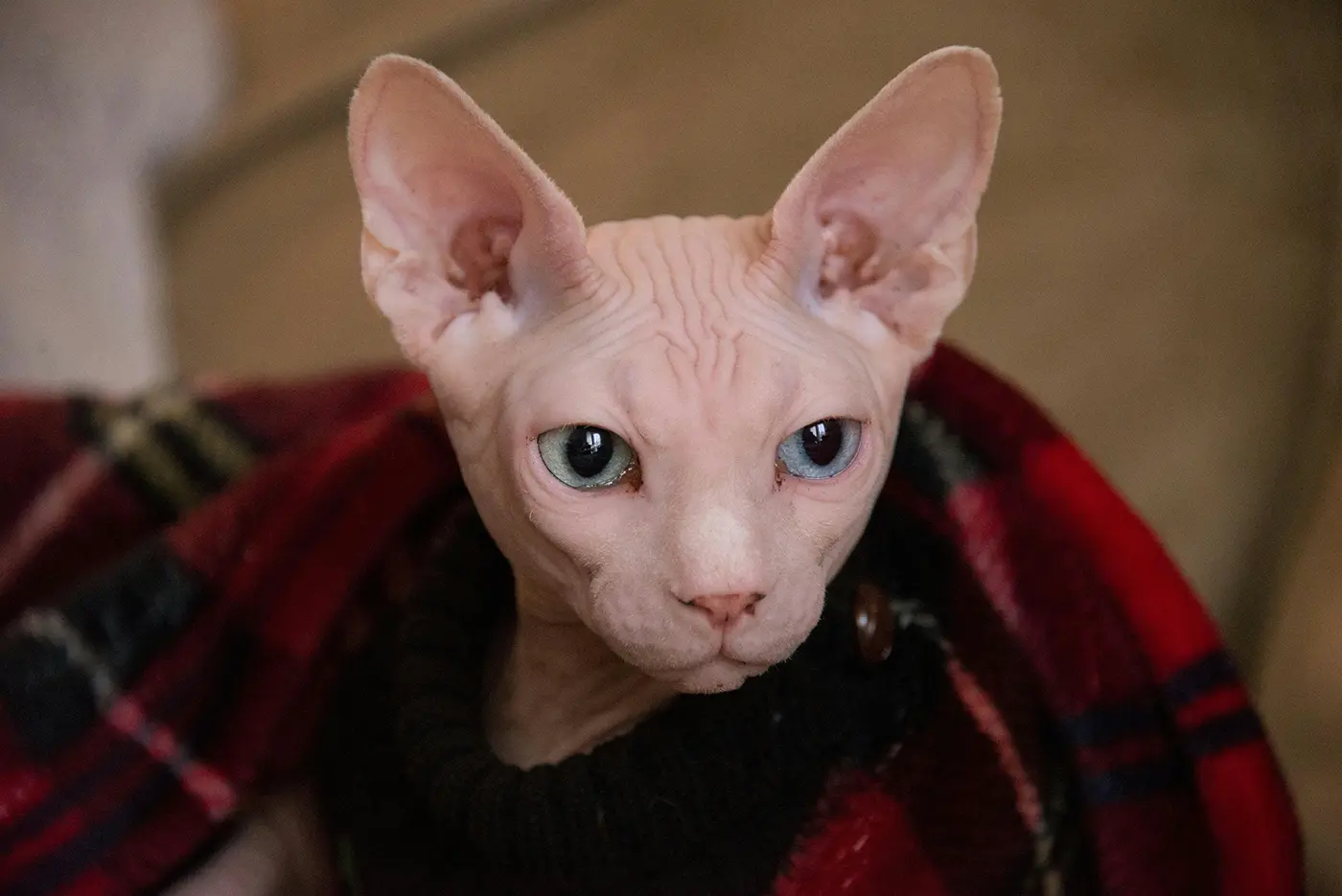
A particular detail of this breed is the presence of folds, which are more prominent in areas such as the neck, abdomen and legs. These folds, along with the texture of the skin, add an extra touch of charm and are a point of attraction for cat lovers. Although they may appear delicate, Sphynx cats are robust and have a well-defined muscular build that supports their physical activity. Their overall appearance combines a strong and well-proportioned body with a captivating facial expression, making them truly unforgettable.
Personality and Behavioral Traits of the Sphynx Cat
While some people find them absolutely adorable and interesting due to their physical features, to other people the Sphynx cat can seem aggressive or even scary. In reality, Sphynx cats are extremely affectionate and sociable, developing close bonds with their owners and always seeking human company. Unlike other breeds that can be more independent, the Sphynx needs constant attention and loves to be at the center of activities around the house. It is not uncommon for these cats to follow their owners everywhere, nestle next to them, or even actively participate in their daily activities. This trait makes them ideal for people who want a loyal and loving companion.
In addition to their affectionate nature, Sphynx cats are very playful and curious, which makes them always on the move and looking for new adventures. They need lots of mental and physical stimulation to keep them happy, and interactive games and puzzle toys are great for keeping their attention. They also like to climb and explore their surroundings, so a well-equipped play set or a space specially designed for them can be a great choice. Without activities, they can get bored easily, which can lead to unwanted behaviors.
So, if you don't have a Sphynx cat yet but you want one, you have to consider that the cat of this breed needs a lot of attention from you. She is not the kind of cat you can leave alone for long or ignore.
Another important aspect of Sphynx cats personality is SUITABILITY their. These cats are able to feel comfortable in a variety of environments, whether they live in a small apartment or a large house. He gets along well with children and other pets, having a friendly and non-aggressive temperament. However, it is important to give them a personal space to prevent possible conflicts, especially if introduced into a house with other animals.
The behavioral uniqueness of the Sphynx cat also includes its sensitivity to temperatures. Due to their lack of fur, these cats prefer warm and cozy places and can often be found sleeping under blankets or near heat sources. Additionally, they are known for their distinctive vocalizations, frequently communicating with their owners through a variety of sounds and meows. This combination of affection, intelligence and expressive behavior makes them a unique and charming companion for any animal lover.
Health and nutrition of Sphynx cats
Compared to most cat breeds that do not need a special food, things are different for the Sphynx breed. In fact, the Sphynx cat is completely unique and cannot be compared to any other breed.
Sphynx cats have specific nutritional needs due to their accelerated metabolism and lack of fur, which causes them to burn more calories to maintain their body temperature. For this reason, their diet must be rich in protein of high quality, essential for the development and maintenance of muscle mass. Ideal sources include chicken, fish or beef, supplemented with healthy fats such as those found in fish oil to support healthy skin and energy levels.
A combination of dry and wet food is recommended to meet the nutritional needs of the Sphynx cat. Dry food helps prevent the accumulation of tartar and maintenance dental health, while wet food contributes to additional hydration, crucial for preventing dehydration. Since Sphynxes tend to eat more than other breeds due to their fast metabolism, it is important to monitor their portions to prevent weight problems.
In terms of health, Sphynxes can be prone to certain problems such as hypertrophic cardiomyopathy, a genetic disease that affects the heart. If you have a cat of this breed, regular vet visits and heart monitoring are essential for early detection of this condition. Also, because of their sensitive skin, Sphynx cats can develop skin infections or irritations, so regular baths and the use of appropriate products are indispensable for maintaining skin health.
Careful care also includes protecting the skin against extreme temperatures. Sphynx cats can be sensitive to both cold and sun, so it is recommended that they be kept indoors during the winter and avoid prolonged exposure to sunlight on hot days. A warm blanket or bed can provide extra comfort during colder periods, and applying a cream specially formulated for cats can prevent sunburn.
By providing a balanced diet, regular veterinary check-ups and careful care, Sphynx cats can live long and healthy lives. The Sphynx cat has a life expectancy of about 15 years, but there are many cases in which they ended up living as well up to 20 years. In order for these special cats to remain happy and active, it is very important to constantly monitor their behavior, weight and general health.
How Much Does a Pedigree Sphynx Cat Cost?
A Sphynx cat can be a wonderful companion, but it requires special care and attention from you. Before buying a cat, make sure you have enough time and space to provide for it, plus in addition to the price paid for the cat, it will need food, toys, special accessories and medical checks that involve other expenses .
Also, when you are determined to buy the cat, be well informed about the breeder you are buying it from. It must be transparent about the cat's provenance, health status, parents and pedigree certificates.
Depending on the geographical area and the spread of the breed in your area, but also the quality of the breeder, the price for a Sphynx cat can vary from 300 – 400 EUR and can reach 1500 – 2500 EUR.
Conclusion
The Sphynx cat is a unique and fascinating breed that attracts attention with both its distinctive appearance and its charming personality. The lack of fur gives it an elegant and unusual look, and its velvety skin with fine folds is one of its most representative physical features. Also, the large and expressive eyes, together with the wide and pointed ears, complete the image of this special cat.
Beyond its physical appearance, the Sphynx impresses with its affectionate, playful and energetic demeanor. It is an extremely sociable cat that loves the company of people and other animals, always wanting attention and interaction. Its boundless curiosity and ability to easily adapt make it ideal for families, including those with children or other pets.
Choosing a Sphynx cat means taking on extra responsibility, both in terms of skin care and general health, as well as meeting her emotional and play needs. However, the care and attention provided is amply rewarded by the devotion, affection and unique companionship that this special cat brings to the lives of its owners.
The Sphynx is not just a cat, but a loyal companion, a source of joy and a truly special member of any family that chooses to give it a loving home.
